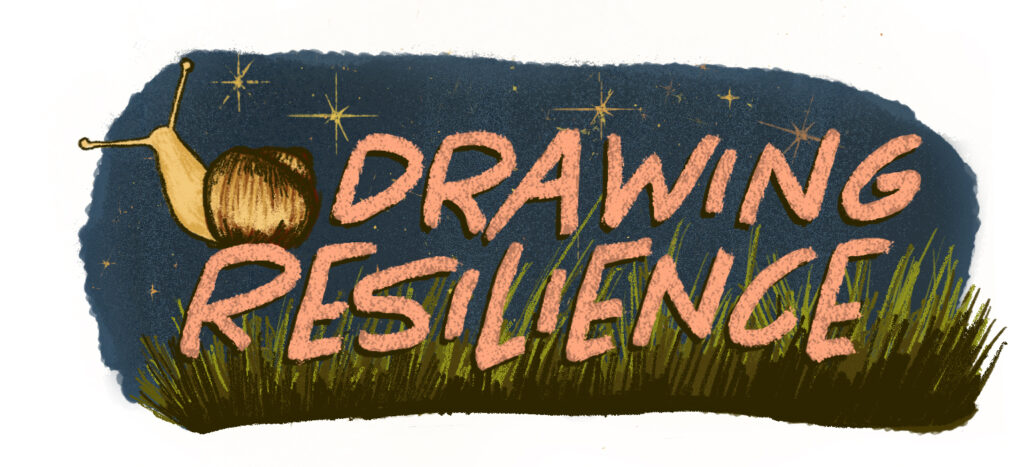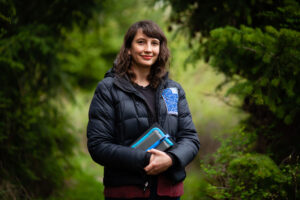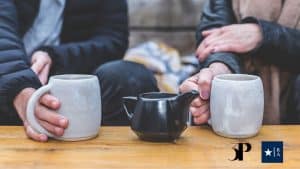

Drawing Resilience: An interview with Laura Fredrickson-Gosewisch
By Nhatt Nichols
Laura Fredrickson-Gosewisch has found a way to intrinsically combine her careers as a massage therapist and farmer through her work to bring self-care practices to the farming community. Through her work with Vital Ground Farm, she has connected farmers with resources to help them understand how to continue working in a sustainable way.
Nhatt:
Did you start as a farmer before you realized that there were opportunities for deeper community connection around health?
Laura Fredrickson-Gosewisch:
Kind of. I started in bodywork because I needed a trade. When I came out at 18, my life went haywire; I spent some time unhoused and was in a lot of extreme poverty. I couldn’t go to college, I had to work full-time. Working with adults with disabilities led me to bodywork, which cracked me open in a way that helped me kind of think about my life, the wisdom of the body, and the way that nature and biology work outside of what we want them to.
While I was experiencing food insecurity, I started growing food. That was a refuge for me to feel like I could do something about my life. I went into farming romanticizing growing food; I wanted to feed the world.
Over time, I became more aware of how much of a struggle it was to be a farmer and that this industry needed a lot of support. There’s a toxic work culture that’s not embracing rest. Everyone was struggling with their quality of life in one way or another, and most people thought that making more money was going to solve that.
I started approaching farming conferences and writing proposals about self-care, and most of them didn’t exactly laugh at me but did the electronic equivalent of laughing at me.
One conference let me speak, and I grew into a person who’s known for talking about what it’s like to farm and using the body as an avenue to connect with yourself and your wisdom. Our intellectual self lives inside this biological being that is nature. No matter how many plans you might have, your body may not cooperate. It has its own set of needs that you need to be cooperative with if you want to get what you want out of your body.
Nhatt:
My experience has been that people who really want a connection to the land, the seasons, and food systems are expected to work in a way that’s unsustainable. If you’re constantly churning through farmers, you can’t build a resilient community or a resilient food system. You need to find a way to encourage personal resiliency before community resiliency can happen.
Laura Fredrickson-Gosewisch:
Sacrificing yourself for the community good can be seen as a badge of honor. People will hold on to their suffering really tightly and say, I’m a farmer, I’m stronger than the average person, I can handle all of this.
Staying checked out of your body is only going to grind you into the ground; making sure you have enough water and granola bars takes a level of planning and commitment to care that has to start at the beginning because once you’re in the middle of overwhelm, you’re beyond your ability to kind of make those decisions.
Nhatt:
What things are you doing to encourage self-care practices? Where are people most receptive to hearing about them?
Laura Fredrickson-Gosewisch:
The best places that I found are at farming conferences, like the Emerging Farmer’s Conference here in Minnesota. It’s for farmers with 10 years of experience or less and non-White farmers. The intersection of white supremacy and work culture in agriculture is very clearly prioritizing productivity, thinking that value is only in money and not in other ways
The Emerging Farmer’s Conference approached me, and I told them I’d love to set up a room where people can wander in during the conference and have a sensory break. We’ll turn the lights down, make a spa atmosphere, and they can feel what rest feels like and remember to seek that out for themselves.
Nhatt:
In my own practice, I’ve struggled to learn that I cannot manhandle myself into working constantly; I actually do need rest.
Laura Fredrickson-Gosewisch:
That’s where it starts: changing the conversation with yourself in a way that is non-judgmental.
Taking the time to connect and reflect on my needs, and saying maybe tomorrow I’ll bring an extra bottle of water to the field because I ran out. Having a relationship with yourself seems like a good place to start.

About the author and illustrator
Nhatt Nichols is a multidisciplinary artist and writer raised on top of a mountain in the Okanogan, Washington State.
A graduate of The Royal Drawing School in London, she uses drawing, poetry, and comics to break down political and environmental issues, finding new ways to meet people where they are, and ask them to reach deeper into their ability to care and take action.
Get this and other rural content in your inbox with the Rural Assembly newsletter.







